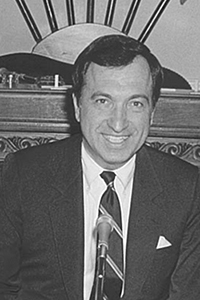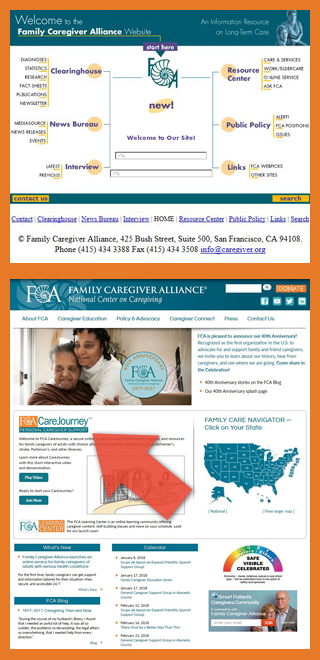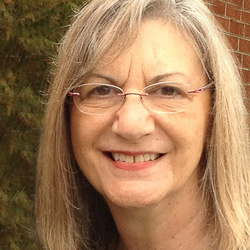1977–2017: Caregiving Then and Now
January 3, 2018
“During the course of my husband’s illness, I found that I needed an awful lot of help. It was all so sudden, the problems so devastating, the legal affairs so overwhelming, that I needed help from every direction.”
—Suzanne Harris, FCA Co-Founder
When Sue Harris spoke those words more than four decades ago, she had been abruptly thrust into a caregiving role she never anticipated. And at that time, there was simply nowhere for her and her family to turn for help.
In 1977, when Family Caregiver Alliance formally began, family caregivers were an unseen, unheard, and unrecognized part of the healthcare team. Yet then, as now, their work was critical to the millions of individuals suffering from long-term, debilitating health conditions. These were families and friends caring at home for loved ones with cognitive disorders like Alzheimer’s disease, stroke, and brain injury—conditions that left previously independent adults in need of extensive hands-on assistance, usually for years, sometimes for decades.
At the time, professionals—physicians, policy makers, reporters, even experts in aging—didn’t always “get” the need for programs to support this population and ease some of their stress. Further, for caregiving families, exposing these personal, private issues to public scrutiny was new and uncomfortable. Because there was such reluctance to talk about the emotional, financial, and physical challenges of care—or because their concerns were dismissed by the very people they looked to for help—families and caregivers often lived in isolation and suffered in silence.
The Beginnings of Change
As our previous 40th Anniversary blogs pointed out, the creation of Family Caregiver Alliance was not a simple process. Although the needs were always there, a convergence of timing and luck propelled progress. The right people were in the right place at the right time. FCA’s earliest successes were built upon the talents and passion of individuals with amazing determination, organizational skills, and the willingness to speak out.
The policy issues they grappled with were, and still are, extremely complicated. The depth of the need was enormous, yet not always visible. The funding goals seemed impossible. But the founding organizers, along with the first paid staff members, persisted. “And,” says Executive Director Kathy Kelly, “we didn’t know what we didn’t know … and that was a good thing!”
As the group forged ahead, they gained support from the San Francisco Mental Health Association and then, most importantly, the California Department of Mental Health and the state legislature.

One of the first items of business was to complete a needs assessment of adults with brain impairments and their family caregivers, producing the first database of information about caregivers and caregiving. The founding group could then focus on developing services based on solid evidence of what families needed and wanted.
By 1979, thanks to legislation supported by Assemblyman Art Agnos, core services of the project were funded, including information, emotional support, respite care, education, and legal consultation. That same year, FCA helped launch the Alzheimer’s Association, to further help families dealing with the devastating illness that was just gaining public recognition.
Progress continued as awareness of caregiving issues grew. In 1984, a first-in-the-nation statewide system of Caregiver Resource Centers was funded by state legislation, based on the FCA model. All Californians now had access to services. In 2000, FCA’s programs served as a model for the National Caregiver Support Program under the Older Americans Act. And in 2001, Family Caregiver Alliance’s National Center on Caregiving was established.
In the four decades since FCA went from a San Francisco committee to a nonprofit organization with national impact, we’ve seen monumental changes in programs and services for caregivers. Some of these remarkable innovations are listed below.
In Education, Support, and Awareness:
- FCA’s local services and referrals, originally set up to help caregivers of individuals with adult-onset cognitive disorders, have expanded to a broader population of older people needing care.
- We offer a wide range of resource referrals to caregivers nationally, through the online Services by State and phone consultations.
- Families learn from FCA’s extensive educational programs, in person and online, on all subjects relating to caregiving, including behavioral issues, coping with stress, life after placement, legal considerations, decision-making, health conditions, and more.
- FCA Fact and Tip Sheets, which cover a wide range of topics, are used by families, healthcare practitioners, universities, legislative staff, authors, senior centers, and many others.
- FCA has developed programs to respond to unique needs of our diverse and multicultural population, including specialized LGBTQ+ programs; educational programs and materials translated into many languages; joint workshops and programs with a multitude of community organizations that reach a wide and varied audience.
- The definition of “family” has broadened as well, to be as inclusive as possible.
- Caregivers have access to expanded community respite options, including adult day care, temporary stays at facilities, and unique programs such as FCA’s Caregiver Retreats and Respite Weekends.
- Programs for caregivers of U.S. veterans have increased and expanded.
- We’re working with other organizations to change hospital communications and discharge procedures to ensure that families and caregivers are taken into account (although difficulties with HIPAA regulations still endure).
- In-home aides and staff at long-term care facilities have access to better training to assist those with Alzheimer’s disease and other cognitive impairments.
- Caregivers’ knowledge and awareness of legal issues has expanded, as we encourage preparation of such essential documents as Powers of Attorney and Advance Directives.
- Caregiving is in the news now: we get calls weekly from reporters seeking information and interviews.
- Support groups and counseling continue as vital core programs for no-longer isolated families and caregivers.

In Caregiving and Technology:
- The effects of the Internet cannot be overstated when it comes to caregiving. FCA’s first website was launched in 1995. Families have 24/7 access to health and caregiving information and online support groups. Archived educational programs and webinars offer training for professionals and families.
- Online help is available to locate services and plan care; FCA CareNav offers personalized service.
- Caregivers enjoy easier outreach to family members and friends and the ability to email doctors.
- Other tech tools and devices include in-home monitoring; GPS trackers; automatic medication dispensers; telemedicine; and health record tracking.
- Additionally, advanced technology has led to better diagnostic tools; computers and telephones are adapted for the disabled; “universal design” makes it safer for the elderly to remain at home.
In Caregiving and Employment:
- In 2002, FCA worked to establish California’s Paid Family Leave Act, which covers not only new parents, but people taking care of ill or elderly family members.
- Some companies now offer caregiver referral services; leave for their employees who provide care at home; long-term care insurance; or even subsidized in-home care and on-site support groups.
- Paid family leave is now one of the top health and wellness benefits employees request.
- Paid family leave is under consideration at the federal level.
In Caregiving and Public Policy:
- FCA is a public voice for caregivers. With help from our clients, we have worked to educate local and national legislators on issues of importance to family caregivers. This crucial work continues as the organization has gained national stature.
- We regularly are asked to speak at professional conferences and meetings.
- FCA’s monthly Caregiving Policy Digest keeps families and professionals up-to-date on relevant public policy issues.
- We monitor and report on current changes in healthcare policy that impact caregiving families.
- We support revisions in tax laws for families undertaking care at home.
- We encourage Social Security changes so that family members who must take time off work to provide care are not financially penalized.
- We continue to seek state and federal funding, along with corporate grants and donations from friends of the organization, to maintain and extend services.
- We continue to innovate, based—always—on caregiver needs.
Perhaps no one could have predicted that the first public task force meeting in a San Francisco church 40 years ago would lead to a national movement to recognize the immense contribution of family caregivers to the long-term healthcare of the ill and elderly in our country. Family Caregiver Alliance’s decades of service to caregivers are testament to the ability of a small group of determined people, defined by their passion and persistence, to effect significant and long-lasting change. We’ve made a difference in people’s lives. We are proud and grateful for our history and for the words shared by a client: “You are my lifeline.”
— Bonnie Lawrence, former FCA Manager of Communications and Media Relations

*Art Agnos Photo: By Nancy Pelosi [CC BY 2.0 (https://creativecommons.org/licenses/by/2.0/)], via Wikimedia Commons
